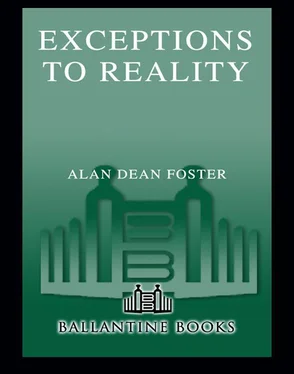Alan Foster - Exceptions to Reality
Здесь есть возможность читать онлайн «Alan Foster - Exceptions to Reality» весь текст электронной книги совершенно бесплатно (целиком полную версию без сокращений). В некоторых случаях можно слушать аудио, скачать через торрент в формате fb2 и присутствует краткое содержание. Жанр: Старинная литература, на английском языке. Описание произведения, (предисловие) а так же отзывы посетителей доступны на портале библиотеки ЛибКат.
- Название:Exceptions to Reality
- Автор:
- Жанр:
- Год:неизвестен
- ISBN:нет данных
- Рейтинг книги:4 / 5. Голосов: 1
-
Избранное:Добавить в избранное
- Отзывы:
-
Ваша оценка:
- 80
- 1
- 2
- 3
- 4
- 5
Exceptions to Reality: краткое содержание, описание и аннотация
Предлагаем к чтению аннотацию, описание, краткое содержание или предисловие (зависит от того, что написал сам автор книги «Exceptions to Reality»). Если вы не нашли необходимую информацию о книге — напишите в комментариях, мы постараемся отыскать её.
Exceptions to Reality — читать онлайн бесплатно полную книгу (весь текст) целиком
Ниже представлен текст книги, разбитый по страницам. Система сохранения места последней прочитанной страницы, позволяет с удобством читать онлайн бесплатно книгу «Exceptions to Reality», без необходимости каждый раз заново искать на чём Вы остановились. Поставьте закладку, и сможете в любой момент перейти на страницу, на которой закончили чтение.
Интервал:
Закладка:
“I haven’t been on a rez since I left New York for London,” Threerivers protested. “I haven’t cost one tribe an Indian nickel in the last year and a half.”
“You’re too dangerous to have around,” the other man pointed out. “If anyone, anywhere, finds out about what you can do, the news will get back to the States. And then we have the problem. Once the wendigo is out, you can’t put him back in his hole.” He gestured downward. “Mind the stairs.”
Threerivers turned left instead of right. Before they could question his decision, they found themselves confronted by a waiter wheeling a hot room-service dinner for two toward a second-floor room. Threerivers had turned that way because he had smelled the electric food warmer approaching. He was counting on the fact that the assassin would not risk shooting the waiter and that the pistol he was holding was not equipped with a silencer. When he made his break, darting forward and around the startled server, he gave the food cart a hard shove sideways. Spicy Brazilian food went flying, the waiter yelled in surprise, someone stuck her head out a door to see what was happening, and Threerivers was sprinting for the service exit. Whenever he checked into a new hotel, one of the first things he did was mark the location of alternative exits.
They didn’t catch him. By the time his pursuers found the service exit, he had managed to flag down a passing car. Waving a fistful of bills to persuade the startled driver, he was soon speeding away from the threatening ocean.
His pursuers went straight to the airport, but they were not sanguine about encountering their quarry there. In this they were right: Threerivers was too smart, too experienced to chance taking the first plane out of town now that his presence had been detected.
When the old bus finally rattled into Recife days later, he booked a cabin on a freighter and vanished into the Atlantic. They never caught up with him again. In the course of his travels, Threerivers had learned a lot about gambling. Despite his peculiar talent, he knew when to quit. If only his pursuers could have accepted his word that he would, his last flight would have been unnecessary. Seven figures, he decided, were of more comfort to a man alive than eight to a man permanently abed deep in the earth. He never set foot in a casino again—or, for that matter, in a city that boasted a casino.
They kept searching for him, of course, not willing to take the chance that he would keep his ability permanently under wraps. They did not find him. No one thought to look on the coast of the island-nation of Sri Lanka, a hundred miles south of its sultry capital city of Colombo. There it was that a certain expatriate Amerind lived in quiet luxury amid beautiful people who were darker than himself. He married and had four children, two of whom demonstrated the most curious propensity for fixing obstreperous computers and stereos, while the perfectly beautiful little girl spoke repeatedly of her intention to one day start her own software company. Her friends chattered instead about boys and music and movies and school, and sometimes they laughed at her behind her back.
But then, none of them could feel the Net.
Rate of Exchange
I once shepherded to the Grand Canyon a very talented and opinionated software engineer who worked for Symantec back in the Mesozoic era when having four megs of RAM and a real black-on-white screen on your home computer was considered cutting-edge technology. In the course of making conversation during the two-hour-plus drive from my home up to the national park, I asked him what he might like to do if he was not deeply embedded in the software industry. I forget his reply. (How’s that for a punch line?) He then turned the question back on me. Hoping to provoke an interesting response, I avowed as how I might be a trader in international currency.
“Scum of the Earth,” he replied tautly.
Marx certainly would have thought so. An ideal example of a profession that generates income while producing nothing in the way of real goods. Now, I confess that I do not personally know any currency traders. I do have a couple of friends who deal in international commodities and futures—everything from orange juice to iron ore—and these two gentlemen happen to be quite pleasant folk. But at least their work involves trade in actual goods and not just the wily adjustment of figures inside computer programs.
Every day, vast fortunes rise and fall on the predictions, suppositions, and manipulations of currency dealers. These individuals exist in a cyberworld of their own, have their own arcane tribal lingo, and must perforce possess a confidence beside which that of the most prominent sports stars pales into bumbling uncertainty.
As you can see, obviously a subject gravid with humorous potential.
Speaking of worlds that exist in cyberspace, this story first appeared as a promotional tie-in for America Online. This is therefore its first appearance on a portion of the corpse of a remanufactured coniferous Terran life-form.
Parker-Piggott’s morninghad proven very profitable indeed, and he fully expected the afternoon’s business to go as well. While Wall Street shut down for the day and the Hang Sen went to sleep, the men and women who traded in the world’s currencies never rested. It was not true, as it was sometimes rumored, that there were certain individuals in the business who never slept. A trader needed a full night’s rest to function efficiently in an environment where millions upon tens of millions were wagered on value shifts as ephemeral as fractions of a yen—or baht or euro or rupee.
He was very good at what he did, was Geoffrey Parker-Piggott. His success had imbued him with a confidence that left others thinking him smug. Perhaps he was, a little. But not to the point where it affected his work. Never to the point where it affected his work. Smugness had been the ruin of many a previously victorious speculator. Parker-Piggott assiduously avoided stepping on that especially dangerous path.
By the time he had concluded lunch with three of his colleagues, including the beauteous but somewhat glacial Jennifer Lowen, the ruble had risen nearly 0.8 percent against the dollar. He smiled to himself as he watched the figures, like so many agitated insects, crawl across the screen. There were three such screens in his office, all connected to one another yet monitoring distinct sources. While he often wished for a third eye so he could keep a permanent watch on each one, he did an excellent job of monitoring them all nonetheless.
One monitor displayed figures, the other options, the third world news. Four tourists beaten up and robbed in the Masai Mara less than an hour ago. Instantly Parker-Piggott was working the lines, filching quotes, and changing one and a half million Kenyan shillings into those of its slightly more prosperous and stable neighbor, Tanzania. He was at little risk because the transaction was fully covered by a congruent forward position founded on solid South African rand. Thanks to his complex maneuvering, if the Kenyan shilling went down, then he would make money thanks to his forwards in South Africa. Conversely, if the Kenyan currency held firm, he would make money in Tanzania. Leaning back in the thickly padded and very expensive leather chair, he placed his hands behind his head and smiled contentedly. Life was good. Most people were not too bright, especially when it came to their money. This put Parker-Piggott, who was much brighter than most, especially when it came to other people’s money, in an enviable position.
Seeing an opportunity to place six hundred thousand for a good customer, he proceeded to purchase a trustworthy basket of Scandinavian currencies. Little volatility there, but a safe investment he could sell off in a week or so at a slight profit. The customer would be grateful, and Parker-Piggott would chalk the humble transaction up to good public relations. Next time he would be able to take a bigger risk with the man’s money. The beauty of the business was that whether the currencies traded went up or down, his commission remained the same.
Читать дальшеИнтервал:
Закладка:
Похожие книги на «Exceptions to Reality»
Представляем Вашему вниманию похожие книги на «Exceptions to Reality» списком для выбора. Мы отобрали схожую по названию и смыслу литературу в надежде предоставить читателям больше вариантов отыскать новые, интересные, ещё непрочитанные произведения.
Обсуждение, отзывы о книге «Exceptions to Reality» и просто собственные мнения читателей. Оставьте ваши комментарии, напишите, что Вы думаете о произведении, его смысле или главных героях. Укажите что конкретно понравилось, а что нет, и почему Вы так считаете.










